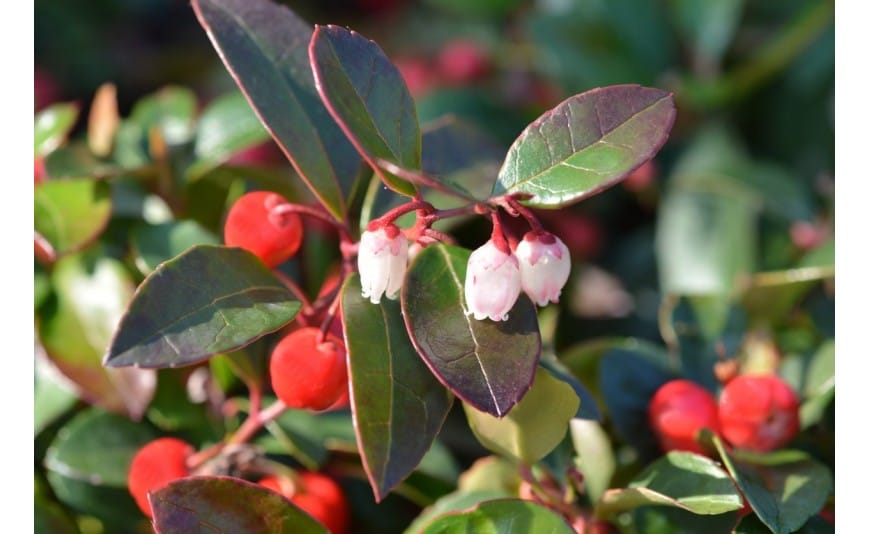Origin of Wintergreen
Wintergreen, also known as Gaultheria, is a shrub belonging to the Ericaceae family. It is found mainly in the mountainous regions of Asia and America. It is characterised by its small green leaves, white flowers and red berries. For centuries, this plant has been used in traditional medicine for its curative properties.
Composition and benefits of Wintergreen
Wintergreen contains a high concentration of an active compound called methyl salicylate, which is also present in aspirin. This gives it anti-inflammatory, analgesic and antipyretic properties. It is also rich in flavonoids, polyphenols and tannins, which have antioxidant and anti-inflammatory properties.
Thanks to its composition, Wintergreen has numerous health benefits. Here are the main ones:
- Reduced muscle and joint pain: Due to its anti-inflammatory and analgesic properties, Wintergreen is often used to relieve muscle and joint pain, such as arthritis and tendonitis. It can also be effective in relieving menstrual pain.
- Relieves pain associated with headaches and migraines: Due to its methyl salicylate content, Wintergreen can help reduce headaches and migraines. It relaxes tense muscles, promoting blood circulation and reducing the sensation of pain.
- Improving oral health: Thanks to its antioxidant and antimicrobial properties, Wintergreen can help prevent tooth decay and fight oral infections.
- Stimulation of blood circulation : Massaging the skin with essential oil of Wintergreen can improve blood circulation, which can be beneficial for cardiovascular health.
- Reduced stress and fatigue: By using Wintergreen essential oil in aromatherapy, you can take advantage of its relaxing and stimulating properties to reduce stress and mental and physical fatigue.
Use of Gaultheria as a dietary supplement
Wintergreen can be taken in a variety of forms, including herbal teas, infusions, capsules and essential oils. As a food supplementIt can be used to treat a variety of health problems, including :
- Muscular and joint pain: It can be useful in the treatment of arthritis, tendonitis, foot pain or aches and pains.
- Digestive problems: Its antispasmodic properties can relieve stomach upsets, bloating and nausea.
- Skin problems: It can be used to relieve itching and skin irritation, as well as treating acne and pimples.
- Respiratory problems: Its anti-inflammatory action can help relieve coughs, bronchitis and other respiratory problems.
However, it is important to note that Wintergreen should not be used as a replacement for medical treatment. If you suffer from a medical condition, it is important to consult a health professional before starting to use this dietary supplement.
Precautions for use
Although Wintergreen is generally considered safe when used as a dietary supplement, it is important to take certain precautions:
- Contraindications: People with kidney problems, liver disease, bleeding or allergies to aspirin should avoid Wintergreen.
- Infants and children: Wintergreen should not be used on babies and young children due to the risk of Reye's syndrome, a rare but potentially serious disease affecting the brain and liver.
- Pregnant and breast-feeding women: Pregnant or breast-feeding women should avoid using Wintergreen as it can cause uterine contractions and affect milk production.
- Side effects and interactions : Wintergreen can cause side effects such as skin allergies, headaches and gastric irritation when taken in large quantities or in combination with certain medicines. It is therefore important to follow the recommendations of a health professional and consult a doctor if in doubt.
Bonus tip
Wintergreen can also be used as an ingredient in cosmetic products, such as creams and massage lotions. Its anti-inflammatory and antioxidant properties can benefit the skin by reducing the signs of ageing and improving its texture.
Summary:
Wintergreen is a plant native to Asia and America that has been used for centuries for its healing properties. Thanks to its composition, which is rich in methyl salicylate and antioxidants, it has numerous health benefits, in particular for relieving muscle and joint pain, headaches, oral and dental problems and improving blood circulation. It can be used as a dietary supplement, but it is important to take certain precautions and consult a health professional if in doubt. In addition to its medical uses, Wintergreen can also be used in cosmetics for its beneficial effects on the skin.











